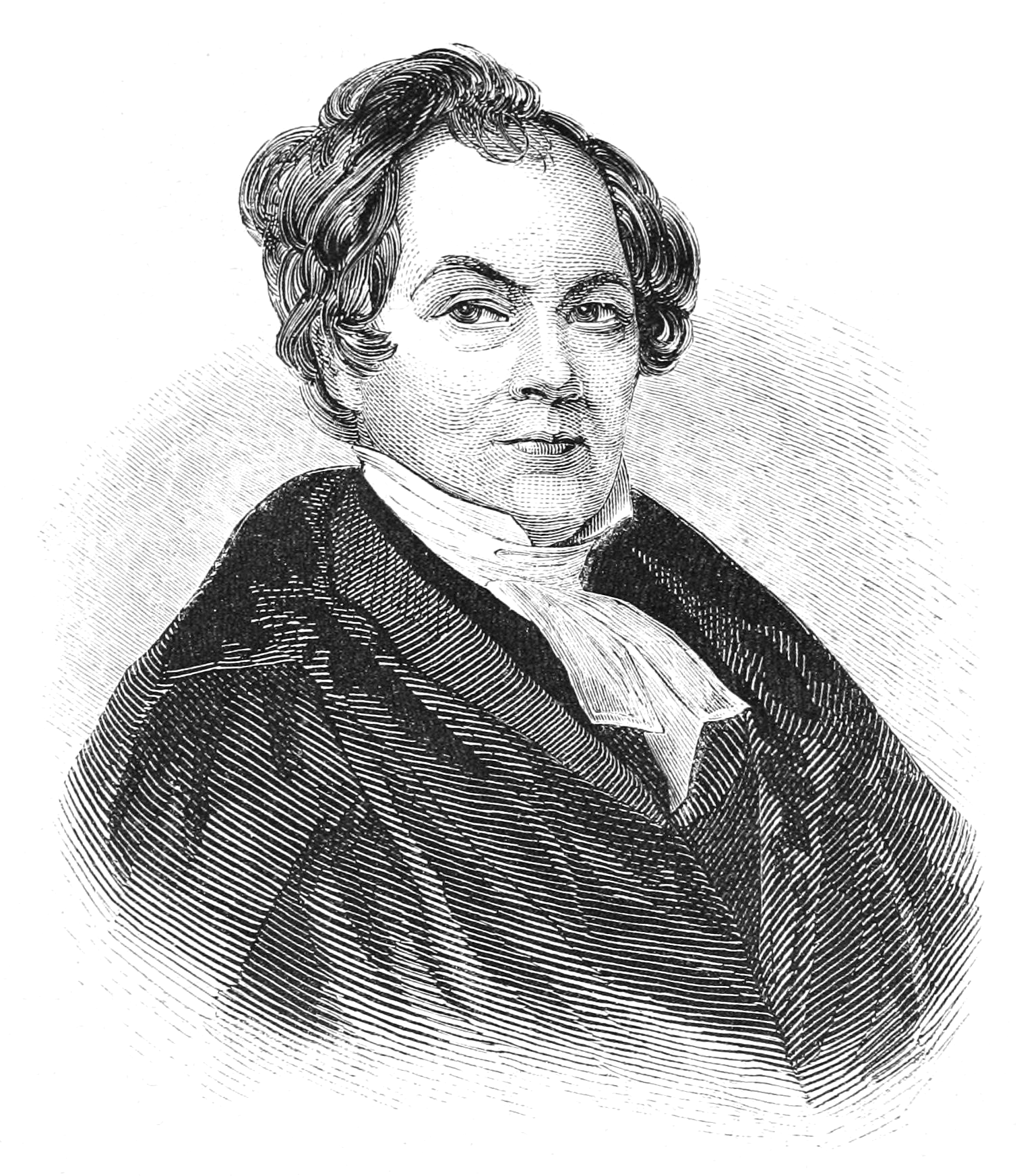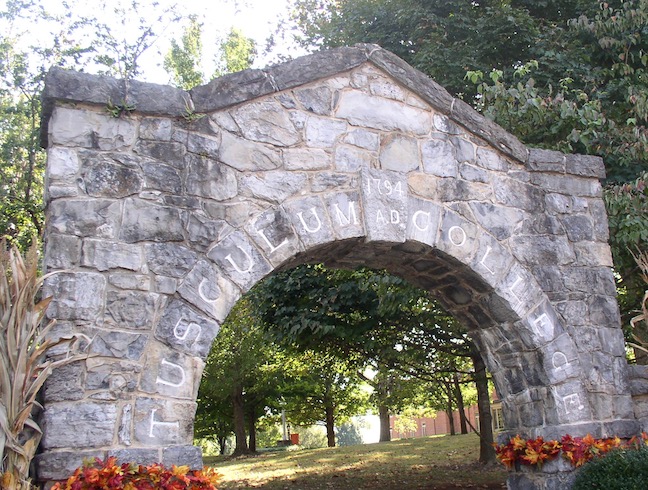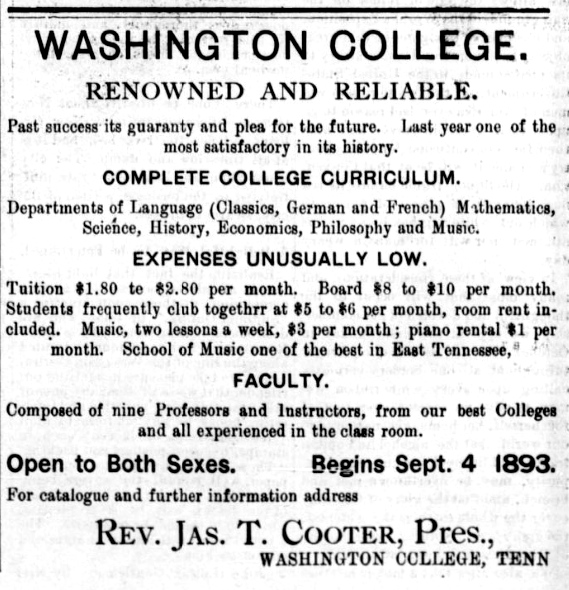|
Samuel Doak
Samuel Doak (1749–1830) was an American Presbyterian clergyman, Calvinist educator, and a former slave owner in the early movement in the United States for the abolition of slavery. Early life Samuel Doak was born August 1, 1749, in Augusta County, Virginia, to Scotch-Irish immigrants Samuel and Jane (Mitchell) Doak. He grew up on a frontier farm and began his education with Robert Alexander, who later founded the Academy of Liberty Hall (now Washington and Lee University). After attending an academy in Maryland, he entered the College of New Jersey (now Princeton), from which he graduated two years later in 1775. Doak married Esther Houston Montgomery of Augusta County in October 1775. Career Doak taught at Hampden-Sydney College in the spring of 1776. There he studied theology under president Samuel Stanhope Smith, and completed his theological training in 1777 at Liberty Hall. He assumed his first pastorate in Abingdon, Virginia, and also began to "ride circuit" in eastern T ... [...More Info...] [...Related Items...] OR: [Wikipedia] [Google] [Baidu] |
Presbyterianism
Presbyterianism is a part of the Reformed tradition within Protestantism that broke from the Roman Catholic Church in Scotland by John Knox, who was a priest at St. Giles Cathedral (Church of Scotland). Presbyterian churches derive their name from the presbyterian form of church government by representative assemblies of elders. Many Reformed churches are organised this way, but the word ''Presbyterian'', when capitalized, is often applied to churches that trace their roots to the Church of Scotland or to English Dissenter groups that formed during the English Civil War. Presbyterian theology typically emphasizes the sovereignty of God, the authority of the Scriptures, and the necessity of grace through faith in Christ. Presbyterian church government was ensured in Scotland by the Acts of Union in 1707, which created the Kingdom of Great Britain. In fact, most Presbyterians found in England can trace a Scottish connection, and the Presbyterian denomination was also taken ... [...More Info...] [...Related Items...] OR: [Wikipedia] [Google] [Baidu] |
Limestone, Tennessee
Limestone is an unincorporated community on the western border of Washington County and the eastern border of Greene County in the northeastern part of the U.S. state of Tennessee. Its zip code is 37681. Limestone is part of the Johnson City Metropolitan Statistical Area, which is a component of the Johnson City– Kingsport–Bristol, TN- VA Combined Statistical Area – commonly known as the " Tri-Cities" region. History Washington College Academy was founded in Limestone in 1780 by Rev. Samuel Doak, and was the first institution to bear the name of the first American president. Limestone was the birthplace of David Crockett (1786) to John and Rebecca Crockett. The Gillespie House, built in 1792 by pioneer settler George Gillespie, still stands in Limestone. One of the locations used in the TV movie ''Goodbye, Miss 4th of July'' (1988) was the Old Stone House in Limestone.James Brooks, ''Images of America: Limestone'', Arcadia Publishing, 2006. Education Stude ... [...More Info...] [...Related Items...] OR: [Wikipedia] [Google] [Baidu] |
1830 Deaths
Year 183 ( CLXXXIII) was a common year starting on Tuesday (link will display the full calendar) of the Julian calendar. At the time, it was known as the Year of the Consulship of Aurelius and Victorinus (or, less frequently, year 936 ''Ab urbe condita''). The denomination 183 for this year has been used since the early medieval period, when the Anno Domini calendar era became the prevalent method in Europe for naming years. Events By place Roman Empire * An assassination attempt on Emperor Commodus by members of the Senate fails. Births * January 26 – Lady Zhen, wife of the Cao Wei state Emperor Cao Pi (d. 221) * Hu Zong, Chinese general, official and poet of the Eastern Wu state (d. 242) * Liu Zan (Zhengming), Chinese general of the Eastern Wu state (d. 255) * Lu Xun Zhou Shuren (25 September 1881 – 19 October 1936), better known by his pen name Lu Xun (or Lu Sun; ; Wade–Giles: Lu Hsün), was a Chinese writer, essayist, poet, and literary critic. He ... [...More Info...] [...Related Items...] OR: [Wikipedia] [Google] [Baidu] |
1749 Births
Events January–March * January 3 ** Benning Wentworth issues the first of the New Hampshire Grants, leading to the establishment of Vermont. ** The first issue of ''Berlingske'', Denmark's oldest continually operating newspaper, is published. * January 21 – The Teatro Filarmonico, the main opera theater in Verona, Italy, is destroyed by fire. It is rebuilt in 1754. * February – The second part of John Cleland's erotic novel ''Fanny Hill'' (''Memoirs of a Woman of Pleasure'') is published in London. The author is released from debtors' prison in March. * February 28 – Henry Fielding's comic novel ''The History of Tom Jones, a Foundling'' is published in London. Also this year, Fielding becomes magistrate at Bow Street, and first enlists the help of the Bow Street Runners, an early police force (eight men at first). * March 6 – A "corpse riot" breaks out in Glasgow after a body disappears from a churchyard in the Gorbals district. Suspicion fa ... [...More Info...] [...Related Items...] OR: [Wikipedia] [Google] [Baidu] |
William Buell Sprague
William Buell Sprague (October 16, 1795 Andover, Connecticut - May 7, 1876 Flushing, New York) was an American Congregational and Presbyterian clergyman and compiler of ''Annals of the American Pulpit'' (nine volumes, 1857–1869), a comprehensive biographical dictionary of the leading American Protestant Christian ministers who died before 1850. Biography He was educated at Yale under Timothy Dwight IV, graduating in 1815, then studied at Princeton Theological Seminary under Dr. Archibald Alexander and Samuel Miller. He became assistant to Rev. Joseph Lathrop at the West Springfield, Massachusetts, Congregational church in 1819. The following year, when Lathrop died after sixty years as pastor there, Sprague became senior minister and served there nine more years. Thereafter, he accepted a call to pastor the Second Presbyterian Church, Albany, New York, where Edward Norris Kirk had been an assistant, and where Sprague ministered for forty years. Sprague wrote numerous books ... [...More Info...] [...Related Items...] OR: [Wikipedia] [Google] [Baidu] |
Slavery
Slavery and enslavement are both the state and the condition of being a slave—someone forbidden to quit one's service for an enslaver, and who is treated by the enslaver as property. Slavery typically involves slaves being made to perform some form of work while also having their location or residence dictated by the enslaver. Many historical cases of enslavement occurred as a result of breaking the law, becoming indebted, or suffering a military defeat; other forms of slavery were instituted along demographic lines such as race. Slaves may be kept in bondage for life or for a fixed period of time, after which they would be granted freedom. Although slavery is usually involuntary and involves coercion, there are also cases where people voluntarily enter into slavery to pay a debt or earn money due to poverty. In the course of human history, slavery was a typical feature of civilization, and was legal in most societies, but it is now outlawed in most countries of the w ... [...More Info...] [...Related Items...] OR: [Wikipedia] [Google] [Baidu] |
Iniquity
Iniquity is moral injustice, wickedness or sin. It may refer to: * Iniquity (band), a Danish death metal group established in 1989 * ''Iniquity'', a 2008 album by the American deathcore band Catalepsy Catalepsy (from Ancient Greek , , "seizing, grasping") is a nervous condition characterized by muscular rigidity and fixity of posture regardless of external stimuli, as well as decreased sensitivity to pain. Signs and symptoms Symptoms inc ... See also * {{disambig ... [...More Info...] [...Related Items...] OR: [Wikipedia] [Google] [Baidu] |
Doctor Of Divinity
A Doctor of Divinity (D.D. or DDiv; la, Doctor Divinitatis) is the holder of an advanced academic degree in divinity. In the United Kingdom, it is considered an advanced doctoral degree. At the University of Oxford, doctors of divinity are ranked first in "academic precedence and standing", while at the University of Cambridge they rank ahead of all other doctors in the "order of seniority of graduates". In some countries, such as in the United States, the degree of doctor of divinity is usually an honorary degree and not a research or academic degree. Doctor of Divinity by country or church British Isles In the United Kingdom and Ireland, the degree is a higher doctorate conferred by universities upon a religious scholar of standing and distinction, usually for accomplishments beyond the Ph.D. level. Bishops of the Church of England have traditionally held Oxford, Cambridge, Dublin, or Lambeth degrees making them doctors of divinity. At the University of Oxford, docto ... [...More Info...] [...Related Items...] OR: [Wikipedia] [Google] [Baidu] |
Tusculum University
Tusculum University is a private Presbyterian university with its main campus in Tusculum, Tennessee. It is Tennessee's first university and the 28th-oldest operating college in the United States. In addition to its main campus, the institution maintains a regional center for Adult and Online Studies in Knoxville, and Morristown. History Before Tennessee became a state in 1796, the east Tennessee area was the southwestern frontier of the United States. Presbyterian ministers Hezekiah Balch and Samuel Doak, both educated at the College of New Jersey (now Princeton University), were there, ministering to early Scots-Irish settlers. Striving to meet the settlers' educational needs, Doak founded Martin Academy in 1783, which was expanded to become Washington College in 1795. Washington College was briefly merged in the 20th century with Tusculum College. Balch was the first president of Greeneville College in 1794. In 1806, emancipated slave John Gloucester became the first A ... [...More Info...] [...Related Items...] OR: [Wikipedia] [Google] [Baidu] |
Washington College Academy
Washington College Academy was a private Presbyterian-affiliated educational institution located in Washington College, Limestone, Tennessee. Founded in 1780 by Doctor of Divinity Samuel Doak, the academy for many years offered accredited college, junior college and college preparatory instruction to day and boarding students, but financial difficulties in the 2000s forced the school to restructure its offerings and focus instead on continuing education courses for adults. Now, the Washington College Academy School for Arts & Crafts offers a variety of classes in metalsmithing, glass, clay, fiber, and mixed media. The academy also hosts a General Educational Development (GED) program to assist area residents in meeting the high school-level academic skills necessary for GED certification. The academy also offers baseball and softball facilities. The academy is also home to Washington county's most recent addition to the Northeast Tennessee Quilt Trail. Depicting a hand painted quil ... [...More Info...] [...Related Items...] OR: [Wikipedia] [Google] [Baidu] |
Hezekiah Balch
Hezekiah Balch, D.D. (1741–1810) was a Presbyterian minister and the founder of Greeneville College (Greeneville, Tennessee) in 1794. After the Civil War, Greeneville College merged with what is now Tusculum University. Early life and education He was born in 1741 in Harford County, Maryland, along Deer Creek. While he was still a child, Balch's family moved south to Mecklenburg County, North Carolina. Due to the recommendation of a local preacher, he attended Princeton starting in 1758. In 1766, Balch received his Master of Arts from Princeton and was licensed to preach August 11, 1768. He was ordained as an evangelist on March 8, 1770. Work Balch's first acts as a pastor were as a missionary in the rural areas of Maryland, Pennsylvania, and North Carolina. After his travels as a missionary, he settled in Greeneville, Tennessee and then became the first settled pastor of what is now First Presbyterian Church in 1783. In 1794 he was granted a charter for Greeneville Co ... [...More Info...] [...Related Items...] OR: [Wikipedia] [Google] [Baidu] |
First Presbyterian Church (Greeneville, Tennessee)
The First Presbyterian Church in Greeneville, Tennessee is a historic congregation of the Presbyterian Church (U.S.A.) located in downtown Greeneville, TN. It was the first church established in Greeneville and is one of the oldest churches in the State of Tennessee. First Presbyterian Church, originally Mount Bethel Presbyterian Church, was first gathered in 1780 at the Big Spring in downtown Greeneville, with the first services preached by traveling frontier minister Samuel Doak. In 1783, regular services began, and Rev. Hezekiah Balch was the first settled Minister (Christianity), minister. History A log church was built near the present day Greeneville Town Hall and in 1798 after a split involving a theological rift over Hopkinsianism, the church was renamed Harmony Church. In 1840, the name was changed to Greeneville Presbyterian Church. The present brick building was erected in 1848. In 1928, a fire destroyed the interior of the sanctuary; however, the brick walls were ... [...More Info...] [...Related Items...] OR: [Wikipedia] [Google] [Baidu] |






